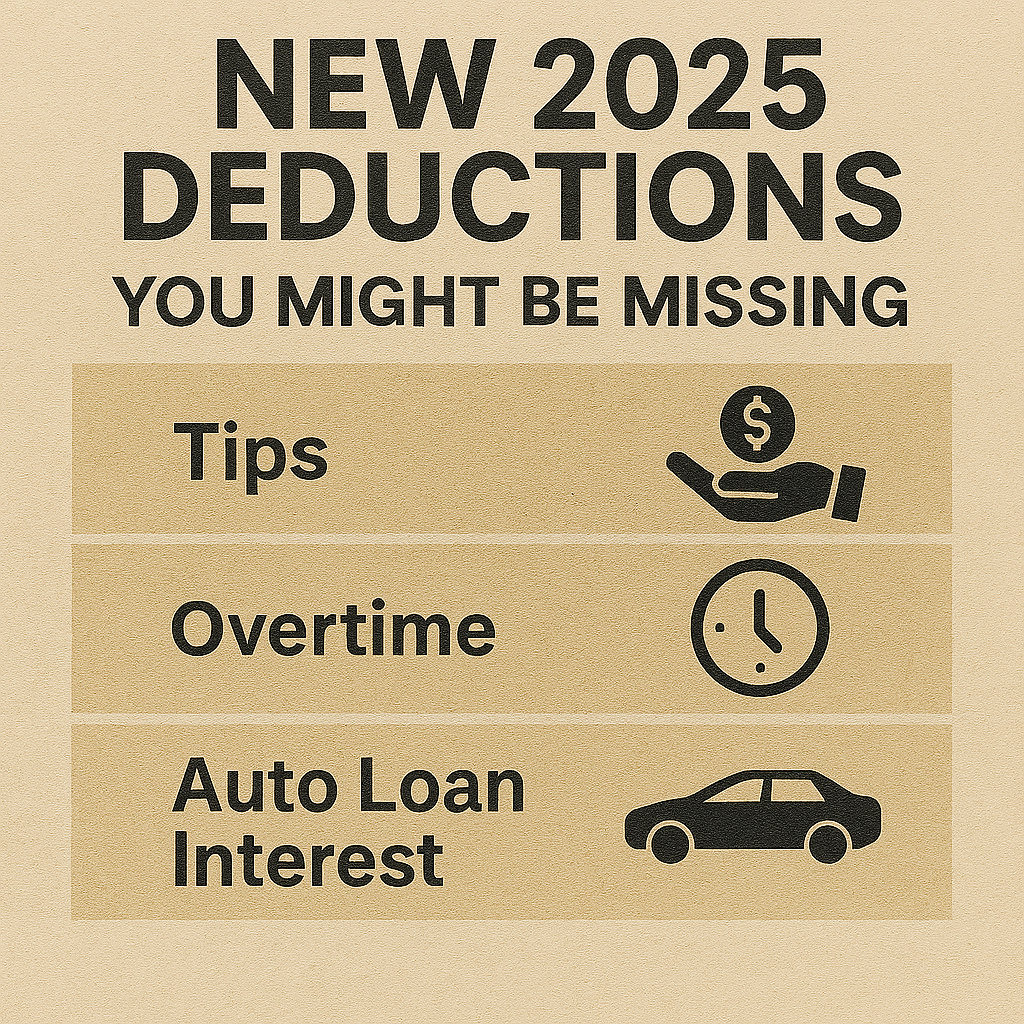
Claiming every dollar: Taxpayers discover overlooked 2025 deductions for tip income, overtime, and auto loan interest.
Introduction: Don’t Miss These New Deductions in 2025
The 2025 tax code quietly introduced three powerful deductions that many taxpayers may not even know exist: deductions for tip income, overtime pay, and auto loan interest. These changes arrived as part of the broader tax reform bill and are now available to qualifying individuals who meet simple criteria.
This guide covers everything you need to know about claiming these new 2025 Tax Deductions, including eligibility, documentation tips, and strategies to maximize each one.
Introduction: New Tax Breaks Most People Miss in 2025
If you earn tips, work long hours, or drive for work — 2025 has a tax surprise for you. Quietly introduced under the One Big Beautiful Bill Act, three new deductions now allow eligible taxpayers to reduce their taxable income using:
- Tip income deduction
- Overtime pay deduction
- Auto loan interest deduction
These 2025 Tax Deductions could save you thousands — but you must know how to qualify, calculate, and file for them correctly. Let’s dig into what each deduction is, who qualifies, and how to claim them without triggering an audit.
Tip Income Deduction: Relief for the Service Industry
Service workers who report tips now qualify for a deduction up to $25,000 per year if certain conditions are met. This is a major shift for taxpayers in restaurants, salons, and hospitality who’ve traditionally paid full income and payroll tax on tipped earnings.
Eligibility Criteria:
- Must work in a tipped occupation listed by the IRS
- Tips must be reported on Form W-2, Form 1099, or Form 4137
- Income must be below $150,000 (or $300,000 for joint filers)
Claiming the Deduction:
- Report tips accurately using IRS-approved forms
- Include your Social Security Number and file jointly if married
- Use IRS guidance to confirm your occupation qualifies
Overtime Pay Deduction: Support for Overworked Employees
Working 50+ hours a week? You’re likely eligible for the new $12,500 overtime deduction, aimed at compensating the grind of extended labor hours. Available across manufacturing, logistics, healthcare, and retail sectors.
To Qualify:
- Receive overtime pay that exceeds your regular rate
- Overtime must be required under the Fair Labor Standards Act (FLSA)
- Income must be below $150,000 (or $300,000 for joint filers)
Claiming Tips:
- Ensure overtime is reported on Form W-2 or Form 1099
- Track hours and pay stubs showing qualified overtime
- Include your Social Security Number and file jointly if married
Auto Loan Interest Deduction: Commuting Just Got Cheaper
If you drive more than 10,000 miles annually for work or commuting, and your vehicle is financed, you may now deduct up to $10,000 in paid loan interest — provided the vehicle meets IRS criteria.
Key Rules:
- Vehicle must be new, purchased after December 31, 2024
- Final assembly must occur in the United States
- Loan must be secured by a lien and used for personal purposes
What to File:
- Include the Vehicle Identification Number (VIN) on your tax return
- Use IRS-provided forms to report qualified interest
- Income must be below $100,000 (or $200,000 for joint filers)
Stacking the Savings: Combined Deduction Potential
Taxpayers who qualify for all three deductions could reduce taxable income by:
- $25,000 – Tip Income Deduction
- $12,500 – Overtime Pay Deduction
- $10,000 – Auto Loan Interest Deduction
Total savings: $47,500 off adjusted gross income — without changing your job or lifestyle.
Filing Best Practices
- Track tip income and mileage with IRS-compliant logs
- Verify employer classification and overtime eligibility
- Confirm vehicle assembly location before purchase
IRS Guidance & Resources
Closing Thoughts: Maximize Every Eligible Dollar
These new 2025 Tax Deductions are designed to help working Americans reduce taxable income and increase refund potential. But like any good thing, they require proactive tracking and accurate filing. Don’t leave free money on the table — take advantage of what this year’s tax reform has made available.
If you earn tips, log long shifts, or finance a vehicle for work, you’re likely eligible. Check the rules, gather documentation, and file with confidence this season.
Disclaimer
The information provided in this blog post is for informational purposes only and should not be construed as legal, tax, or accounting advice. Tax situations are often complex and highly specific to the individual or business. You should contact a qualified tax expert directly to discuss your particular circumstances. Nothing herein is intended to, nor does it, create an attorney-client or advisor-client relationship. For individual guidance, please contact us directly.


